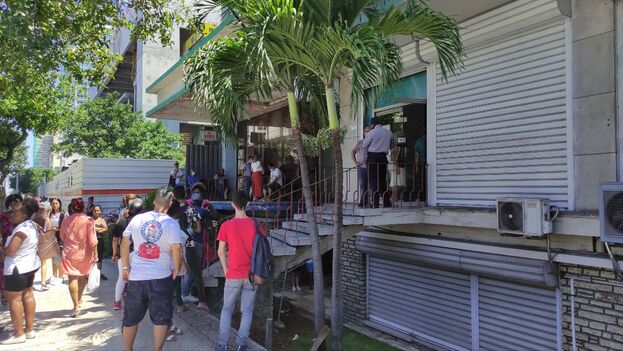
![]() 14ymedio, Juan Diego Rodríguez /Juan Izquierdo, Havana, 22 September 2022 — “No one cheats on me,” a man grumbles in front of the Cadeca [currency exchange] on 23rd Street in Havana, this Tuesday. “I’m not a fool.” His face is swollen and red; he is sweating and drags a crutch with difficulty. Next to him, a sympathetic mulatto in a T-shirt and with a golden tooth nods. “He walked in front of me and went in; it was that simple,” shouts the man. Several people in the line predict a heart attack if he doesn’t calm down.
14ymedio, Juan Diego Rodríguez /Juan Izquierdo, Havana, 22 September 2022 — “No one cheats on me,” a man grumbles in front of the Cadeca [currency exchange] on 23rd Street in Havana, this Tuesday. “I’m not a fool.” His face is swollen and red; he is sweating and drags a crutch with difficulty. Next to him, a sympathetic mulatto in a T-shirt and with a golden tooth nods. “He walked in front of me and went in; it was that simple,” shouts the man. Several people in the line predict a heart attack if he doesn’t calm down.
Beyond, at the door, a lady demands explanations from the policeman who guards the exchange house: “It’s not the first time this has happened today,” she says. The officer looks at her reluctantly, as if he doesn’t understand, and sends the complaint to the “organizer” of the Cadeca line, who calls the customers according to a list.
Everyone witnessed how an individual arrived at the establishment, advanced, distracted, up the stairs and approached the door, beckoning through the glass. The door opened, and the man managed to slip between the policeman and the organizer, who didn’t say a word.
The eyes of the clients followed the event in detail, but they were silent until the subject entered the Cadeca. First it was a buzz of comments; then someone rebuked the organizer of the line, and finally the man on the crutch exploded, left his place and began to scream.
In the face of the screams and fingers pointing at him, the policeman remained calm.
“That one had a ’godfather’ inside the Cadeca,” someone theorizes. Sponsorship consists of having a contact within the establishment, a friend or relative who overcomes obstacles and facilitates access to the first place in line.
The customers can withstand the sun, heat and hunger, but never that someone “unrecognized” approaches and, mysteriously, penetrates the building without waiting: it’s intolerable.
The workers at the Cadeca on 23rd — those at any exchange house in Cuba — have their business of influence. The “chosen” are family or friends, and also coleros who accept a payment to guarantee another person a privileged place.
Those who don’t have a “godfather” must submit to the murky system of “lists,” drawn up illegally after the previous night, which pretends to be a spontaneous form of organization in the face of institutional corruption. The lists include solitary buyers, but also the “gangs” of customers, groups of five or ten people who intend to assault the Cadeca.
However, spending the night in the vicinity of an establishment is considered, by the police, a violation. So they’re authorized to fine or arrest the overnight coleros. But it’s a risk that dollar buyers are willing to take, because without the few bills that the Government agrees to sell, it’s impossible to live decently.
So the man with the crutch calms down, goes up to the policeman and calmly says: “Officer, if you want, arrest me, but tonight I’m going to sleep here, to see who is going to take the first place in line away from me tomorrow.”
Translated by Regina Anavy
____________
COLLABORATE WITH OUR WORK: The 14ymedio team is committed to practicing serious journalism that reflects Cuba’s reality in all its depth. Thank you for joining us on this long journey. We invite you to continue supporting us by becoming a member of 14ymedio now. Together we can continue transforming journalism in Cuba.
